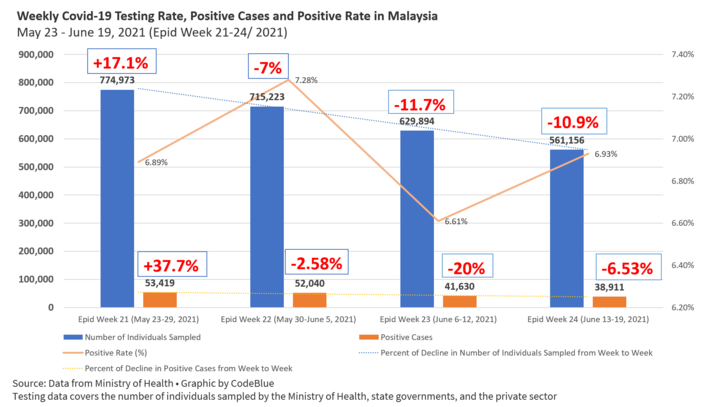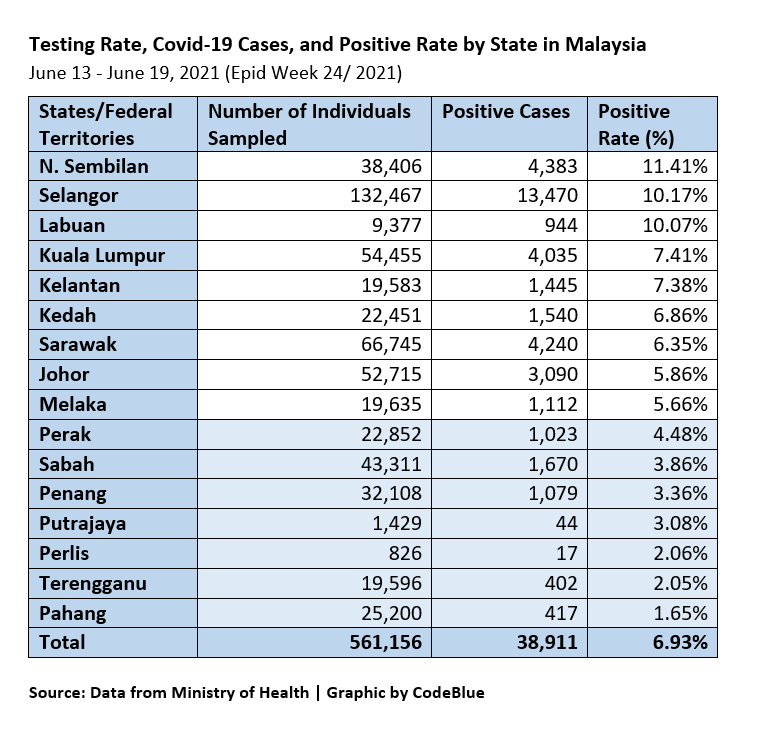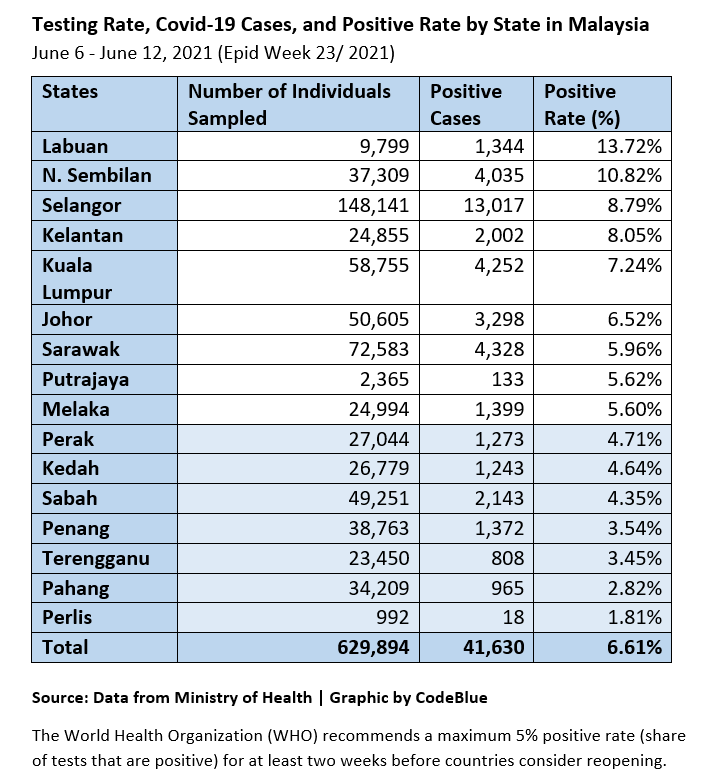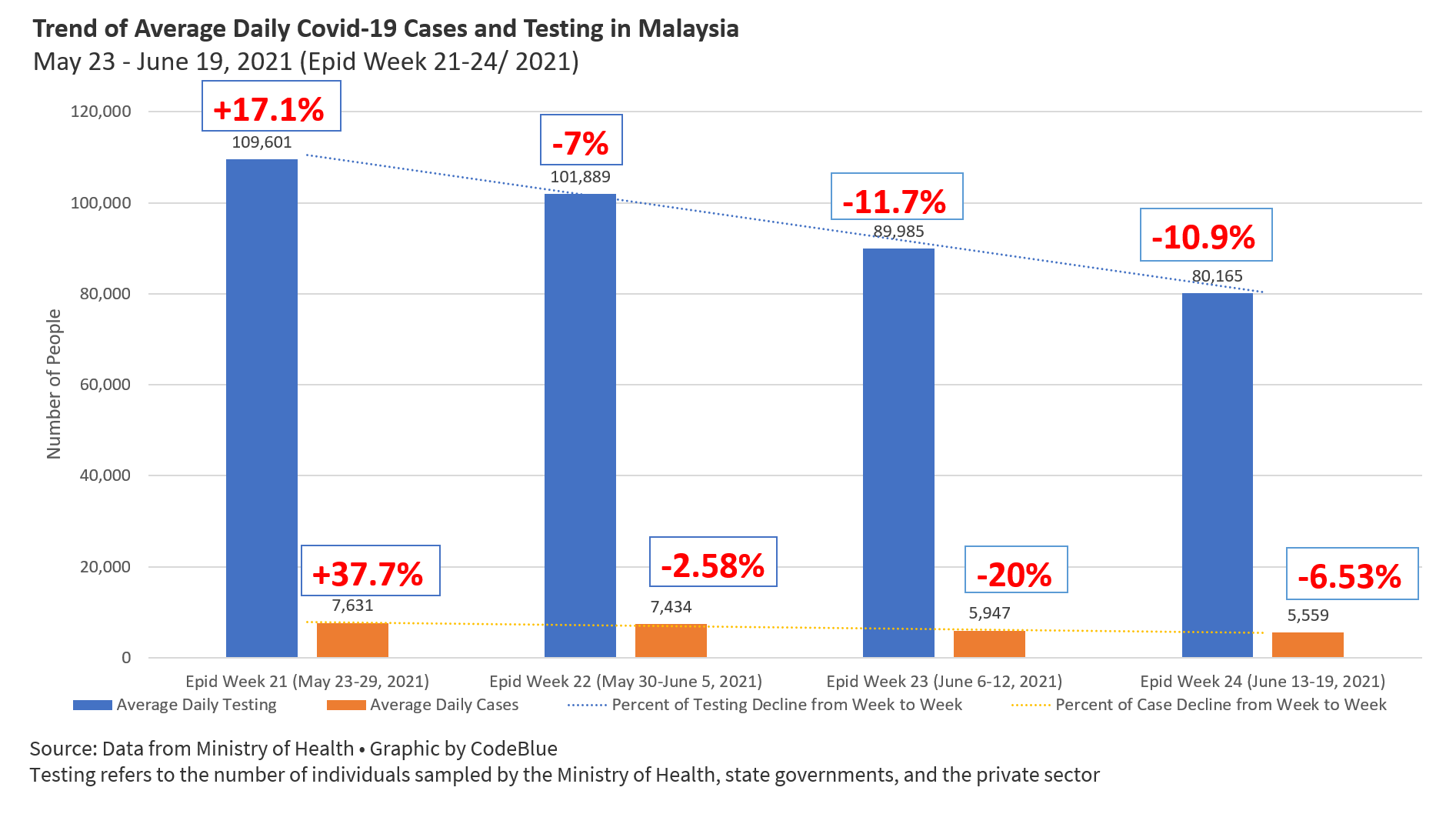KUALA LUMPUR, June 23 — Covid-19 cases in Malaysia decreased at a slower rate the past week from the previous week, some three weeks into the nation’s total lockdown scheduled to end June 28.
This may delay the government’s target of a seven-day average of below 4,000 daily Covid-19 cases to move to Phase Two of the National Recovery Plan, even as screening and surveillance efforts consistently dropped the past three weeks, unlike other countries like the UK that aggressively ramp up testing during fresh outbreaks.
Average daily coronavirus infections in the 24th epidemiological week (June 13 to 19) dropped only by 6.53 per cent to about 5,559 cases from the previous week’s average 5,947 daily infections.
The 6.53 per cent case decline was smaller than the 20 per cent drop in the 23rd epidemiological week (June 6-12) from the 22nd week (May 30-June 5) that recorded an average 7,434 daily cases.
The 6.53 per cent decline in Covid-19 cases in the week of June 13 to 19 — smaller than the 20 per cent decline in the week of June 6 to 12 — occurred amid 10.9 per cent and 11.7 per cent testing reductions in both weeks respectively.

Malaysia’s Covid-19 positive rate rose from 6.61 per cent in the 23rd epidemiological week (June 6-12) to 6.93 per cent in the past week (June 13-19). Throughout the past four weeks, the national positive rate (share of tests that are positive) has remained above the World Health Organization’s (WHO) maximum 5 per cent benchmark of sufficient testing.
Last week’s 6.93 per cent positive rate exceeded the 6.89 per cent positive rate recorded in the week of May 23-29 when 7,631 coronavirus infections were recorded daily on average out of about 109,601 people tested a day.
Covid-19 cases continuously dropped over the past three weeks from the 22nd to 24th epidemiological weeks in line with a constant decline in testing — though the positive rate was not on a consistent upward trend.
Testing decreased from 109,601 people sampled a day on average in the week of May 23-29 to 80,165 people in the past week of June 13-19, while reported Covid-19 infections dropped from a daily average 7,631 to 5,559 cases in the same period.
When testing increased 17.1 per cent in the 21st epidemiological week (May 23-29) from the previous week, Covid-19 cases rose 37.7 per cent.
Testing Declines In Most States Except Johor, Negeri Sembilan

As in the 23rd epidemiological week, Covid-19 testing rates in most states decreased in the week of June 13-19, with Selangor having the highest decrease of 15,674 individuals sampled from the previous week.
Only Johor and Negeri Sembilan increased their testing by 2,110 and 1,097 people respectively in the week of June 13-19 from the previous week.
The positive rate in nine states and federal territories exceeded 5 per cent in the past week, with Negeri Sembilan, Selangor, and Labuan recording double-digit positive rates.
Of the states or federal territories that showed a decline in the positive rate, Labuan had the greatest drop of 3.65 percentage points in the week of June 13-19 from the previous week of June 6-12 (from 13.72 to 10.07 per cent), followed by Putrajaya with a decrease of 2.54 percentage points (from 5.62 to 3.08 per cent)
On the other hand, Kedah had the highest increase of its positive rate by 2.22 percentage points (from 4.64 to 6.86 per cent) in the past week. This was followed by Selangor which recorded a 1.38 percentage point increase in its positive rate (8.79 to 10.17 per cent).

Health Minister Dr Adham Baba told reporters Monday that positive rates in certain states were high because of the extremely high positive rate in several clusters, pointing out that 24 clusters to date recorded positive rates above 80 per cent.
He cited a factory cluster in Selangor, Alam Jaya 2 cluster, that recorded 119 positive cases of 141 people screened.
“This shows that when we do testing, there are high positive rates in certain areas. Therefore, the data that we disclosed just now according to state, we also registered cases from locations with clusters that have high positive rates,” said Dr Adham.
“This is what we use to do genomic surveillance,” he said, adding that Malaysia would conduct 3,000 genomic sequences within the next three months to look for new coronavirus variants. So far, 167 cases with variants of concern have been identified in Malaysia.
From reports released by the Ministry of Health, workplace clusters remain high and they form more than 55 per cent of all the clusters identified since the total lockdown was imposed on June 1.
Cases contributed from workplaces are due to the green light given to many industries to operate during the “total lockdown”.
Poor measures such as employers trying to maintain high operational capacity in workplaces and not having a clear set of directions when employees test positive could lead to an increase in Covid-19 cases and ultimately deter the nation’s effort in cutting transmission.
Although cases from workplace clusters are relatively small compared to sporadic cases whose origin cannot be identified, the true number of cases contributed from workplaces could be higher but unidentified due to Malaysia’s poor contact tracing capability.
Health director-general Dr Noor Hisham Abdullah said Monday that sporadic infections formed 69 per cent of 578,105 Covid-19 cases recorded this year up to June 19. In the 24th epidemiological week (June 13-19), the Klang Valley reported the highest number of unlinked cases in Malaysia.
“Although the Movement Control Order 3.0 announced on May 12 (19th epidemiological week) is seen to be successful in controlling cluster cases in the 24th epidemiological week, sporadic cases do not show a significant decline.”








